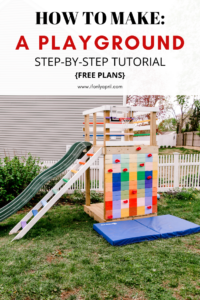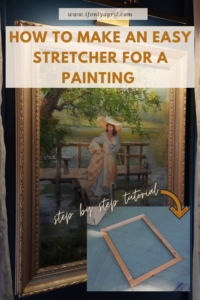DIY can be intimidating for a lot of people. But it’s so much easier to navigate once you are equipped with the knowledge and the right attitude. I am not considering myself a professional, more of a DIY enthusiast that learns as you go. I make mistakes and learn how to fix them. That’s just how it is. And today I’d like to share with you 5 mistakes that you can avoid getting into DIY.
Some of them I didn't know about, some of them I've heard a lot before but didn't pay close attention and a few were direct advice that I ignored.
Stocking up a fully loaded workshop with expensive tools

Sometimes it feels that you need to have a fully loaded workshop in order to start DIY projects. But let me tell you, you don’t! So my tip number one is don’t waste tons of money on expensive tools in the beginning. Start small. The key here is to start!
You probably know that type of people who need to buy all the fancy workout clothes, and expensive equipment before they start working out. In most cases, it ends up just living life on its own without anyone touching it. Don't be like these people!
I’m not going to preach that tools don’t matter, because it’s not true - there are some good tools and not-so-good ones. But for the beginner, it doesn’t matter. I started with Ryobi tools and still love them to this day.
Choose a project you want to work on, whether it is a home improvement or a furniture build, check the list of tools you need for that project, and buy them. A lot of websites offer PDF plans that include a minimum list of tools that you need to make something.
You can check my shop for some easy furniture builds for beginners that include a list of tools, materials, cut lists, etc.
The first real project that I ever made was a Montessori floor house bed. And to make it, I only had a drill, a miter saw, a Kreg jig, and an orbital sander. Eventually, I grew my tool collection but I started small.

So don’t go crazy and buy only the essential tools that you need.
You might also think you need a massive workshop with a perfect workflow, but in the beginning, don't even bother! Just use your garage and expand as you go.
Speaking of tools that you don’t need, don’t buy tools that you will only use once.
Sometimes your project requires a certain tool, but if you know for a fact that you probably won’t be using it ever again, don’t spend money on it! I have a bunch of small tools that I only used once and now they are just collecting dust in my garage. I’m looking at you, dowel jig!
Underestimating the right time it will take to finish a project.

I always get into a trap of underestimating the time that will take me to complete the project. Always! I’m not sure why it’s so hard to learn that it is never an X hour that you originally thought.
When I started antiquing a thrifted mirror, I was so sure it would take me only a few hours. I ended up applying a gold leaf approximately for 3 hours, not talking about the rest of the project.
Related:
Watch me antiquing a thrifted mirror
So my humble advice would be to budget more time than you think you’ll need. If you finish early, good for you, but it will save you the frustration of not finishing up on time.
It is also important to prepare everything you need before starting. You wouldn’t want to do an emergency run to Home Depot in the middle of the process.
But I’ll let you on a little secret… It will happen to you more times than you think!
The best way is to write down all the materials and tools you need and have a sketch of what you are planning to do and be generous with the amount of time you dedicate.
When I started making a LEGO table for my nephews, I thought I’ll be done in a few hours. Sooooo ambitious! Haha, I ended up spending 2 days on it and a few extra trips to Home Depot because I screwed up a board while cutting it, I used the wrong stain that didn’t work and forgot to buy wood filler. Ugh, that one gave me a run for my money.
Related:
LEGO/activity table (IKEA hack)
This brings me to the next point, but be graceful with the time you plan for a project.
Mistake will always happen! Learn how to deal with mistakes gracefully.
Even if you are a professional DIYer, mistakes can happen. So don’t be scared, if it happens to the best in the industry, it could definitely happen to you!
Learn how to deal with them gracefully. Don’t panic, don’t curse, don’t smash anything. (fine, you can do all the above if you want).
Take a moment to regroup and think about how to fix it. If everything goes wrong, I find it best to take a step back, evaluate the situation, maybe even leave a project for a day or two and come back with a solution.
If you have a cool head, the solution will come. And if it doesn’t, you can always google it. Or search on YouTube, you can find anything there! Duh!
When you DIY mistakes are not really mistakes. You can fix anything, and if you can't you can get new materials and start over!
DIY is a great learning ground for problem-solving.
PIN IT FOR LATER

Not all projects will be great and it’s ok
I love most of my furniture builds and home renovations but there are a few that I consider my great failures. And you know what? I'm fine with it.
You can't expect that every project that you create will be a masterpiece, but as I said in the previous point, practice makes it perfect. Learn as you go and get better next time.
So I learned to love even projects that turned out quite shitty. It was a learning curve and now I know what not to do.
When I just started out I watched YouTube videos on how people make furniture and saw that they used wood glue. I started building my veggies stand and used a brad nailer for the first time. I thought I was too cool for glue haha so I just cut the boards and brad nailed them together.
Yup. I've learned very quickly that no one is too cool for glue. It's not my favorite project but it taught me a great lesson!!!
Related:
A lot of videos that we watch on YouTube shows us professional making things perfectly and not many of them show their mistakes. I'm glad to see a shift in the DIY community that has an honest approach and shows what goes wrong and how to fix it. I try to deliver that message as much as I can in my channel.
It's always better to try and be disappointed in a result than never try at all.
Don't be scared of power tools but use them with respect
Read the instructions before you start. I'm guilty of this but learned a hard way that power toils aren't a toaster and require some special approach.
Power tools could be intimidating but if you follow the safety guidelines everything will be fine. Just follow the guidelines!
I got my first table saw in the summer of 2020 and was quite intimidated to try it out. I built a workbench with a special place for a table saw. During the build, something unexpected happened. I guess I was sloppy or not experienced enough, but when I was using a brad nailer, I drove a nail through my finger by accident.
Related:
You can watch a video of when it happened... Not for the squeamish eyes
That accident shooked me up for a while and I couldn't get back to the garage for a few weeks, let alone to try my new table saw. I was so terrified. But I pulled myself together, read the instructions, geared it up, and proceeded to use a table saw as carefully as I could.
And let me tell you, it was so much less intimidating than I thought! I'm so happy I overcame my fear and now the table saw is one of my favorite power tools.
Talking about safety...
I see a lot of videos on YouTube where makers drink alcohol while using power tools.
While it works for some people, to me it's a hard no. You need to be focused 100%, especially if you are just starting out, and keep your fingers away from a brad nailer!
Use power tools with respect and know your limits! If the table saw intimidated you, take your time, get comfortable with smaller tools and when you master those, move up on this tool ladder to more advanced tools.
Bonus: Don't compare yourself!
And a bonus point, something that took me a while to realize.
A comparison game will set you up for failure!
Let's be honest, I'm not the most skilled woodworker or DIYer and you know what, that's ok. There are so many people way more skilled than I'll ever be - true professionals and craftsmen that excelled in their craft!
I used to compare myself and beat myself up for not being on the level. I've learned to admire them but continue doing what I'm doing. My journey is different, and so is yours!
These are the 5 Simple Mistakes I've learned getting into DIY that you can avoid!
The secret here is to start! Take one step at a time and figure out what you are doing as you go!
Good luck!
xoxo,
April











Leave a Reply